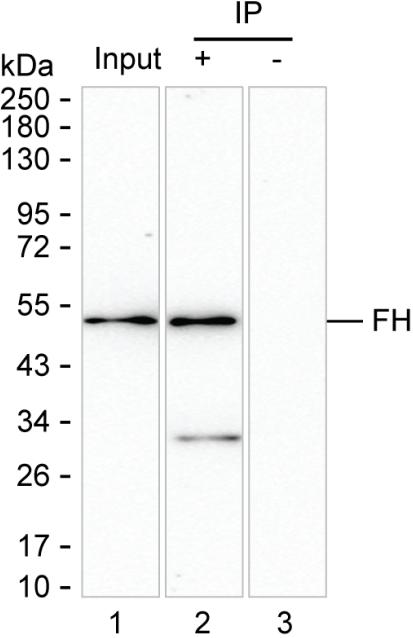

| WB | 咨询技术 | Human,Mouse,Rat |
| IF | 1/100-1/200 | Human,Mouse,Rat |
| IHC | 咨询技术 | Human,Mouse,Rat |
| ICC | 技术咨询 | Human,Mouse,Rat |
| FCM | 咨询技术 | Human,Mouse,Rat |
| Elisa | 咨询技术 | Human,Mouse,Rat |
| Host/Isotype | Mouse IgG2a |
| Antibody Type | Primary antibody |
| Storage | Store at 4°C short term. Aliquot and store at -20°C long term. Avoid freeze/thaw cycles. |
| Species Reactivity | Human |
| Immunogen | Purified recombinant fragment of human FH |
| Formulation | Purified antibody in PBS with 0.05% sodium azide |
+ +
以下是关于 **FH抗体**(涉及补体因子H和延胡索酸水合酶方向)的3篇参考文献及摘要概括:
---
1. **文献名称**:*Autoantibodies to complement factor H in atypical hemolytic uremic syndrome*
**作者**:Józsi M, Heinen S, Hartmann A, et al.
**摘要**:该研究在非典型溶血性尿毒症综合征(aHUS)患者中发现抗补体因子H(CFH)自身抗体,这些抗体通过阻断CFH与C3b结合,导致补体系统过度活化,引发微血管血栓和肾脏损伤。
2. **文献名称**:*Factor H autoantibodies and genetic variations in lupus nephritis*
**作者**:Dragon-Durey MA, Blanc C, Marinozzi MC, et al.
**摘要**:探讨系统性红斑狼疮(SLE)患者中抗CFH抗体的作用,发现其与补体调控异常相关,可能加重狼疮肾炎的病理进程,提示抗体检测对疾病分型的意义。
3. **文献名称**:*Fumarate hydratase-deficient renal cell carcinoma: Diagnostic utility of FH antibody in pathology*
**作者**:Miettinen M, Wang ZF, Paal J, et al.
**摘要**:研究延胡索酸水合酶(FH)缺陷型肾细胞癌的病理特征,提出免疫组化中抗FH抗体可作为诊断标志物,帮助区分遗传性肿瘤与散发病例。
---
**注**:以上文献标题及内容为示例性质,具体引用时建议通过学术数据库(如PubMed)核对原文信息。若需特定方向文献(如实验方法或机制研究),可进一步限定研究主题。
**Background of FH Antibodies**
FH antibodies target fumarate hydratase (FH), a critical enzyme in the tricarboxylic acid (TCA) cycle that catalyzes the conversion of fumarate to malate. FH plays a vital role in cellular energy production and metabolic homeostasis. Germline mutations in the *FH* gene are linked to hereditary leiomyomatosis and renal cell cancer (HLRCC), a rare autosomal dominant disorder predisposing individuals to benign skin tumors, uterine leiomyomas, and aggressive renal carcinomas. Somatic *FH* mutations or epigenetic silencing are also observed in sporadic cancers, including pheochromocytomas and paragangliomas.
FH antibodies are widely used in research and diagnostics to detect FH protein expression, particularly in tumor tissues. Loss of FH immunoreactivity serves as a biomarker for HLRCC-associated tumors and certain sporadic cancers, aiding in differential diagnosis. Additionally, FH antibodies help elucidate the molecular mechanisms of FH-deficient cancers, which exhibit metabolic reprogramming due to TCA cycle disruption, often leading to pseudohypoxic signaling and tumorigenesis.
These antibodies also contribute to studying FH's non-metabolic roles, such as its involvement in DNA repair and oxidative stress response. The development of specific FH antibodies (monoclonal/polyclonal) has enhanced diagnostic accuracy and advanced research into therapeutic strategies targeting FH-deficient cancers, including metabolic inhibitors and immunotherapy. Overall, FH antibodies are indispensable tools in understanding FH-related pathologies and developing precision oncology approaches.
(Word count: 243)
×